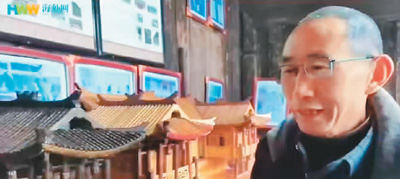E-commerce, intangible cultural heritage inject impetus into rural vitalization in China

Photo shows Wan Taoyuan, an inheritor of the craft of building stilted houses in Enshi Tujia and Miao Autonomous Prefecture, central China’s Hubei Province. (Photo courtesy of Haiwainet.cn)
In 2016, Fu Aihua, who was then a migrant worker, went back to her hometown in Yudian township, Guangshui city, central China’s Hubei Province to engage in the e-commerce business.
At that time, the township encountered difficulties in selling its three specialty vegetables: white eggplant, white cucumber, and Chinese cabbage. Though the vegetables enjoyed a good reputation, they were underpriced and couldn’t reach a wider market, according to Zhu Xiaodong, deputy secretary of the Party committee of Yudian township.
The e-commerce business emerged as an important tool for the locality to expand sales channels of agricultural products. Nowadays, Fu, who runs an e-commerce company, has become a livestreaming host who promotes local agricultural products on short-video platforms.
“Through livestreaming, the vegetables from Yudian can now reach markets across the country,” said Zhu.
In China’s drive to reduce poverty and boost rural rejuvenation, the e-commerce industry provides a platform for farmers to sell agricultural products to more places.
Jiayi village, located in Xinhe county in Aksu Prefecture, northwest China’s Xinjiang Uygur Autonomous Region, is a famous production base of musical instruments. The musical instruments made there are sold to places all over the world.
“A high-quality musical instrument is sold for 1,500 yuan ($228.9), and an average instrument can be sold for between 400 and 500 yuan,” said a local villager named Kurban Shemshi.
As a member of the cooperative in his village, he has taught the necessary manufacturing skills in making musical instruments to 15 people, becoming a leader in defeating poverty in his village.
Zhong Xiumei, first secretary stationed in the village, said that in 2020, Jiayi village built a musical instrument industrial park and established partnerships with e-commerce platforms.
“We hold two livestreaming shows each day, with each show lasting two hours on average,” said Zhong, who stated that the earnings generated from the musical instrument business account for more than 70 percent of the village’s total income.
In addition to e-commerce, intangible cultural heritage also plays a role in advancing rural vitalization. China’s “No. 1 central document” for 2022 unveiled earlier this year stressed that intensified efforts should be taken to carry forward and protect the farming culture and promote conservation and utilization of intangible cultural heritage and important agricultural heritage sites.
Wan Taoyuan is an inheritor of the craft of building stilted houses in Enshi Tujia and Miao Autonomous Prefecture in Hubei. The craft of building stilted houses in Enshi is a national intangible cultural heritage in China.
Wan began making miniature models of stilted buildings since 2007. Today, his artistic works provide vivid materials for students and researchers at multiple universities and colleges to learn about ethnic culture in China.
In addition to stilted houses, Wan’s village, called Wantian village, has done an excellent job in inheriting and protecting other intangible cultural heritage items, such as hand-waving dance and three-stick drums. It has also made full use of the cultural heritage items in advancing rural vitalization.
Photos
Related Stories
- Integration of culture, tourism gives impetus to China’s rural vitalization
- Village in central China’s Henan develops fried dough twist industry, boosts rural vitalization
- Traditional handcrafts give impetus to China’s rural vitalization
- Photographer documents remarkable transformation of village in SW China’s Guizhou over course of more than two decades
- “They have embraced a new life through hard work”: Retired Luxembourg police officer in Guangxi
- County in China’s Yunnan establishes rural talent pool of skilled farmers in push for common prosperity
- County in SE China's Fujian restores ancient residential complexes in pursuit of rural vitalization
- “Science and technology backyards” help drive talent development in China’s rural areas
- Young woman from Guizhou brings fortune to local people through beekeeping industry
- Entrepreneur brings fortune to farmers by promoting cultivation of winter potatoes
Copyright © 2022 People's Daily Online. All Rights Reserved.










